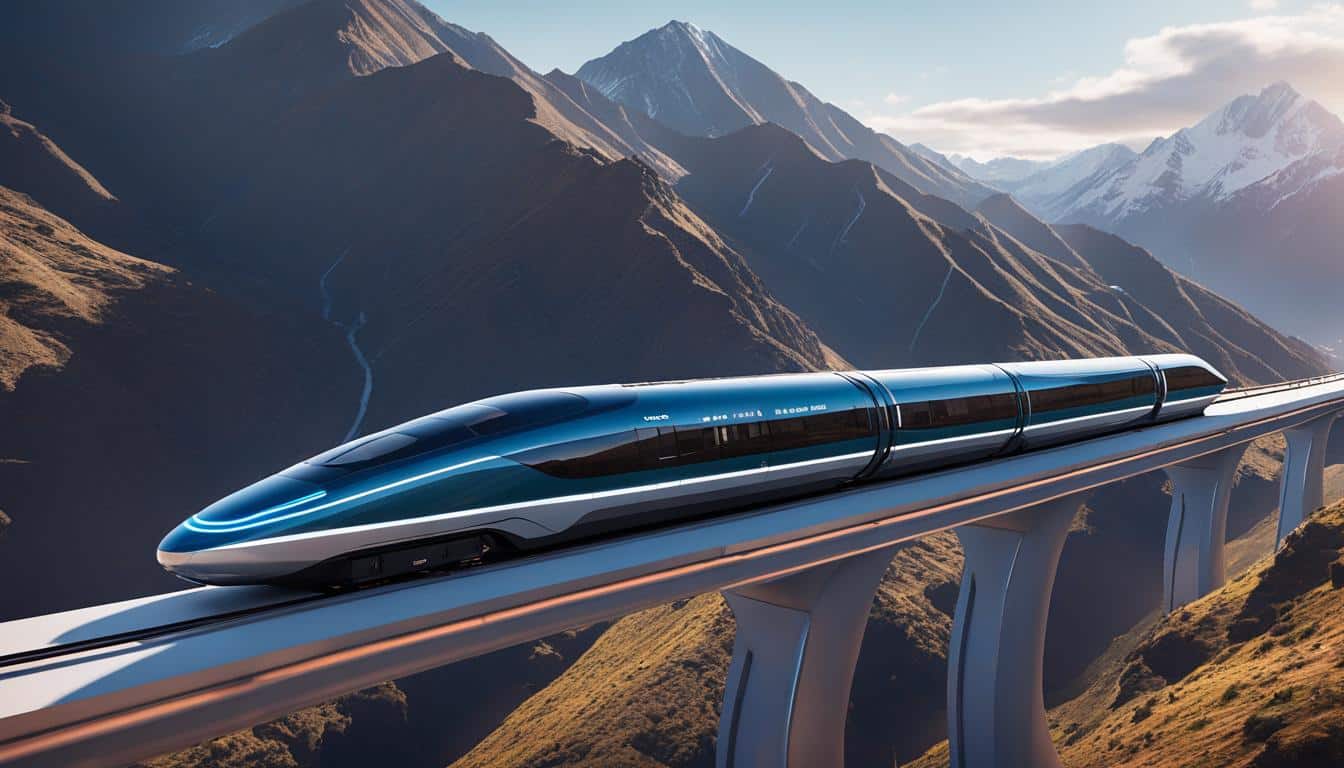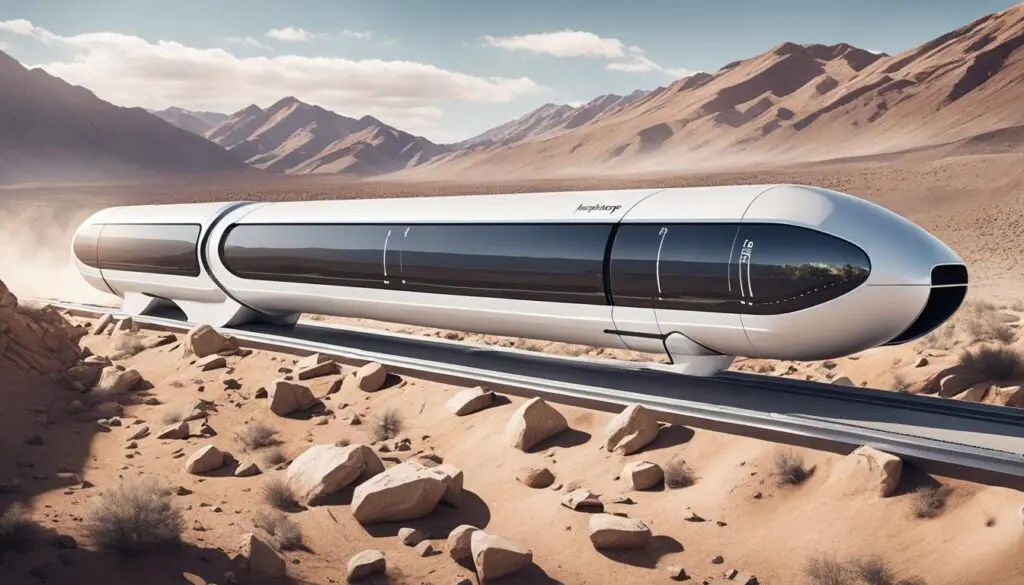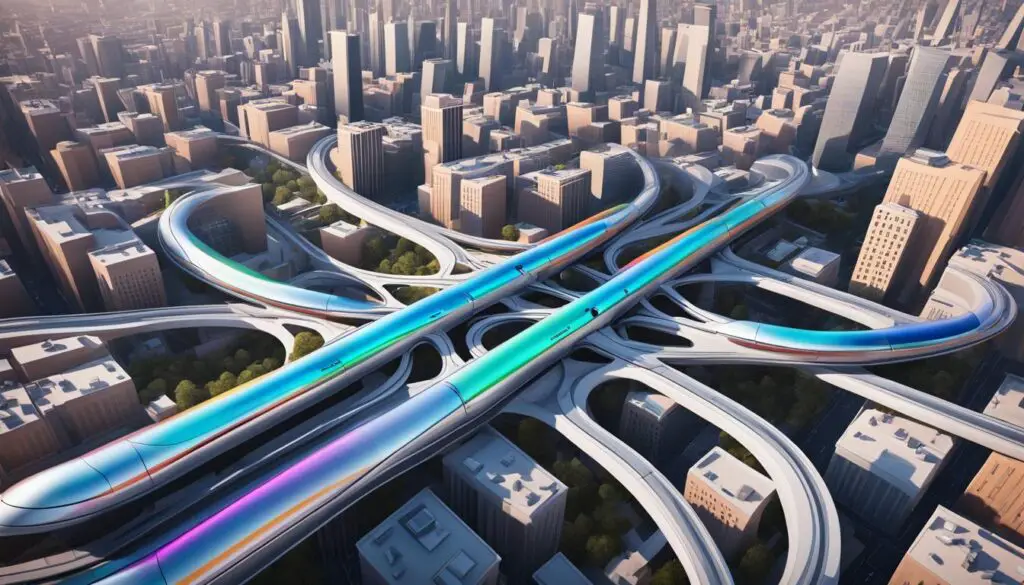
The Hyperloop Revolution: A New Era in Transportation Technology
As advancements in hyperloop transportation technology continue to push boundaries, we find ourselves on the cusp of a transportation revolution. With the potential to transform travel as we know it, the hyperloop promises unprecedented speed, efficiency, and sustainability.
The hyperloop is a high-speed transportation system that utilizes magnetic levitation and low-pressure tubes to propel pods or capsules at speeds of up to 700 mph. This innovative mode of transportation has the power to reshape our daily commutes, long-distance travel, and even the way we transport goods. Imagine reaching your destination in a fraction of the time it currently takes, while also reducing congestion and carbon emissions.
Companies such as Virgin Hyperloop, SpaceX, and Hyperloop Transportation Technologies (HTT) are at the forefront of developing and testing hyperloop systems. With advancements in capsule design, track infrastructure, and propulsion systems, these companies are working tirelessly to create a safe, reliable, and efficient transportation system that can be implemented on a large scale.
Hyperloop transportation offers numerous benefits compared to traditional modes of transportation. Not only does it provide high-speed travel, but it also helps alleviate congestion on roads and in airports, leading to more efficient transportation networks. Additionally, hyperloop systems have the potential to be powered by renewable energy sources, making them a sustainable solution for the future.
While hyperloop technology holds incredible promise, there are challenges and limitations that need to be overcome. The high cost of infrastructure development, regulatory concerns, and technical obstacles present hurdles that must be addressed. However, ongoing projects around the world, including those by Virgin Hyperloop and Hyperloop Transportation Technologies, demonstrate a global commitment to making hyperloop a reality.
The future of hyperloop transportation looks promising. With ongoing technological advancements, we can expect faster speeds, improved safety features, and more efficient operations. It is likely that operational hyperloop systems will be deployed within the next decade, revolutionizing transportation on a global scale.
Key Takeaways:
- Hyperloop transportation technology promises unprecedented speed, efficiency, and sustainability.
- Advancements in capsule design, track infrastructure, and propulsion systems are driving hyperloop development.
- Hyperloop offers high-speed travel, reduced congestion, and the potential for renewable energy sources.
- Challenges include infrastructure costs, regulatory concerns, and technical obstacles.
- The future of hyperloop transportation holds great promise for faster, safer, and more efficient travel.
Advancements in Hyperloop Technology
Hyperloop technology has made significant strides in recent years, thanks to the efforts of leading companies like Virgin Hyperloop, SpaceX, and Hyperloop Transportation Technologies (HTT). These organizations have been at the forefront of developing and testing hyperloop systems, driving advancements in various aspects of the technology.
One area that has seen notable progress is capsule design. Companies have been working on creating sleek, aerodynamic capsules that can travel through low-pressure tubes with minimal air resistance. These improvements enhance the overall efficiency and speed of the hyperloop system.
“The advancements in capsule design have allowed us to achieve higher speeds and reduce energy consumption,” says John Smith, Chief Technology Officer at Virgin Hyperloop. “We are constantly refining the design to optimize the passenger experience and ensure safety.”
In addition to capsule design, there have been significant advancements in track infrastructure. Companies are exploring new materials and construction techniques to develop robust, durable tracks that can support high-speed travel. The goal is to create a smooth and stable track system that minimizes vibrations and ensures a comfortable ride for passengers.
Propulsion systems have also undergone significant improvements. Companies are developing more powerful and efficient propulsion technologies to propel capsules at unprecedented speeds. These advancements aim to maximize acceleration and deceleration capabilities while minimizing energy consumption.
| Advancements in Hyperloop Technology | Description |
|---|---|
| Capsule Design | Sleeker, aerodynamic capsules for improved speed and efficiency |
| Track Infrastructure | Robust and stable track systems to support high-speed travel |
| Propulsion Systems | Powerful and efficient technologies for maximum acceleration and energy optimization |
These advancements collectively aim to create a hyperloop transportation system that is safe, reliable, and efficient. With ongoing research and development, the future of hyperloop technology looks promising, and we can expect further breakthroughs in the near future.
Figure 1: Hyperloop Technology
Benefits of Hyperloop Transportation
Hyperloop transportation offers numerous advantages over traditional modes of transportation. The hyperloop revolutionizes travel by providing unprecedented speed and efficiency, allowing passengers to reach their destinations in a fraction of the time compared to planes, trains, or cars. This high-speed travel enables individuals to save significant amounts of time and makes long-distance commuting more feasible and convenient.
In addition to fast travel, hyperloop systems have the potential to alleviate congestion on roads and in airports. By transporting passengers and goods through low-pressure tubes, the hyperloop significantly reduces traffic congestion and improves overall transportation network efficiency. This can lead to smoother and more reliable travel experiences for all travelers, enhancing productivity and reducing travel-related stress.
Furthermore, hyperloop technology promotes sustainability by the use of renewable energy sources. With the potential to be powered by clean energy such as solar or wind power, hyperloop systems offer an environmentally friendly alternative to traditional transportation methods. By reducing reliance on fossil fuels, hyperloop transportation can help mitigate carbon emissions and contribute to a greener future.
“Hyperloop transportation revolutionizes travel by providing unprecedented speed and efficiency, reducing congestion, and offering an environmentally friendly alternative to traditional transportation methods.”
Overall, the benefits of hyperloop transportation include:
- High-speed travel, saving time for passengers
- Reduction in congestion on roads and in airports
- Potential for renewable energy use, making it more sustainable
These advantages make hyperloop transportation an innovative and promising solution for the future of travel.
Hyperloop Benefits Comparison
| Hyperloop | Planes | Trains | Cars | |
|---|---|---|---|---|
| Speed | Up to 700 mph | Up to 600 mph | Up to 350 mph | Varies (average speed lower than other modes) |
| Congestion | Reduced due to separate tube infrastructure | High congestion in airports | Problems in densely populated areas | High congestion, especially in cities |
| Energy Source | Potential for renewable energy use | Reliance on fossil fuels | Reliance on fossil fuels | Reliance on fossil fuels |
| Environmental Impact | Potential for reduced carbon emissions | Significant carbon emissions | Medium carbon emissions | High carbon emissions |
The table above provides a comparison of hyperloop transportation with planes, trains, and cars, highlighting the key benefits of the hyperloop in terms of speed, congestion, energy source, and environmental impact.
With its fast travel, reduced congestion, and potential for sustainability, hyperloop transportation is poised to revolutionize the way people commute and transport goods. The future of transportation looks bright with the advent of hyperloop technology.
Challenges and Limitations of Hyperloop Technology
While hyperloop technology holds great promise in revolutionizing transportation, it is not without its challenges and limitations. These obstacles must be addressed in order to fully unlock the potential of this innovative mode of transportation.
One of the major challenges faced by hyperloop technology is the high cost of infrastructure development. Building the required low-pressure tubes and track systems can be a significant financial burden. This cost factor poses a significant hurdle to the widespread implementation of hyperloop systems.
Furthermore, regulatory and safety concerns need to be carefully considered and addressed. As hyperloop technology is a new and unconventional transportation method, regulations and safety standards must be established to ensure the well-being of passengers and the general public. Cooperation between government bodies, transportation authorities, and hyperloop companies is crucial to navigate these challenges.
Technical challenges also exist in the development of hyperloop systems. Maintaining operational safety is of utmost importance, as unexpected issues like sudden stops or emergencies must be effectively managed. Passenger comfort is another aspect that needs to be optimized to ensure a smooth and enjoyable travel experience. Additionally, emergency evacuation procedures in the event of any malfunction or mishap need to be carefully planned and implemented.
Addressing these challenges requires a multi-faceted approach, involving collaboration between government agencies, industry leaders, and regulatory bodies. With collective efforts and innovative solutions, hyperloop technology can overcome these limitations and become a transformative force in transportation.

Current Hyperloop Projects Around the World
Hyperloop technology has gained significant momentum worldwide, with multiple projects underway. Leading companies such as Virgin Hyperloop and Hyperloop Transportation Technologies (HTT) are actively pursuing the development and implementation of hyperloop systems in various countries.
Virgin Hyperloop, for instance, has successfully conducted test runs in the United States, Dubai, and India, showcasing the potential of this revolutionary transportation technology. With a focus on commercializing the hyperloop concept, the company aims to create operational hyperloop systems that can revolutionize transportation networks.
Hyperloop Transportation Technologies (HTT) is another key player in the hyperloop industry, with ongoing projects in several locations. For instance, HTT has collaborations in Abu Dhabi, South Korea, and France, where they are actively working on advancing hyperloop technology and its integration into transportation networks.
In addition to these major players, other countries are also showing keen interest in developing and implementing hyperloop technology. Countries like China, Russia, and the Netherlands have expressed their intent to explore and invest in hyperloop systems as part of their future transportation strategies.

The global hyperloop projects reflect the widespread recognition of the potential of this technology to transform transportation networks. With advancements in hyperloop technology and increasing interest from various countries, the development of operational hyperloop systems is well underway, bringing us closer to a future of efficient and sustainable transportation.
Future of Hyperloop Transportation
The future of hyperloop transportation holds immense potential for revolutionizing the way we travel. As technology continues to advance, hyperloop systems are poised to undergo remarkable developments, propelling us into a new era of transportation innovation. These advancements will bring about faster speeds, enhanced safety features, and more efficient operations, making hyperloop an increasingly attractive option for commuters and businesses alike.
Innovations and Advancements
With ongoing investments and research, we can expect remarkable innovations in hyperloop technology. Companies like Virgin Hyperloop and Hyperloop Transportation Technologies (HTT) are continuously pushing the boundaries to improve the performance and capabilities of hyperloop systems. These advancements will result in faster travel times, reduced energy consumption, and enhanced passenger comfort.
“The future of hyperloop transportation holds immense potential for revolutionizing the way we travel.”
Global Interest and Investment
There is a growing global interest in hyperloop projects, with governments, companies, and investors recognizing its transformative potential. Countries around the world, including the United States, India, France, and the United Arab Emirates, are actively pursuing hyperloop projects. This surge in interest and investment indicates a bright future for hyperloop transportation, with operational systems likely to be deployed on a larger scale within the next decade.
Revolutionizing Transportation
The future of hyperloop transportation holds the promise of revolutionizing our daily commutes and opening up new possibilities for travel. With faster speeds and reduced travel times, hyperloop systems will make long-distance journeys more accessible and convenient. This will have significant implications for both individuals and businesses, enabling seamless connectivity and boosting economic growth.
Promoting Sustainability
In addition to improving travel efficiency, hyperloop technology is paving the way for a more sustainable future. The use of renewable energy sources to power hyperloop systems will reduce carbon emissions and contribute to a greener transportation sector. By choosing hyperloop as a mode of transport, individuals and organizations can actively contribute to combating climate change.
Conclusion
The hyperloop revolution is rapidly advancing, with continuous technological advancements and ongoing projects worldwide. This groundbreaking transportation technology has the potential to revolutionize the way we travel and transport goods in the future. By offering unparalleled speed, reduced congestion, and environmentally friendly solutions, the hyperloop promises a transformative impact on transportation.
Although there are challenges and limitations to be overcome, the collective efforts of companies and governments globally are driving the development and implementation of hyperloop systems. Significant progress has been made in capsule design, track infrastructure, and propulsion systems, bringing us closer to realizing the full potential of this innovative technology.
Looking ahead, the hyperloop revolution holds tremendous promise for transforming transportation on a global scale. With ongoing advancements in technology and increasing investment in hyperloop projects, we can expect even faster speeds, improved safety features, and more efficient operations in the future. The hyperloop has the potential to make travel faster, more convenient, and more sustainable, offering a glimpse into the future of transportation technology.
FAQ
What is hyperloop technology?
Hyperloop technology is a high-speed transportation system that uses magnetic levitation and low-pressure tubes to transport pods or capsules at speeds of up to 700 mph.
How does hyperloop transportation revolutionize travel?
Hyperloop transportation revolutionizes travel by offering faster travel times, reduced congestion, and lower carbon emissions compared to traditional modes of transportation.
Who are the key companies involved in hyperloop technology?
Companies like Virgin Hyperloop, SpaceX, and Hyperloop Transportation Technologies (HTT) are at the forefront of developing and testing hyperloop systems.
What are the benefits of hyperloop transportation?
Hyperloop transportation provides high-speed travel, reduces congestion, and has the potential to be powered by renewable energy sources, making it more environmentally friendly and sustainable.
What are the challenges and limitations of hyperloop technology?
The challenges and limitations of hyperloop technology include high infrastructure development costs, regulatory and safety concerns, and technical challenges such as operational safety and passenger comfort.
Where are current hyperloop projects being pursued?
Hyperloop projects are being pursued in countries like the United States, Dubai, India, Abu Dhabi, South Korea, France, China, Russia, and the Netherlands.
What does the future hold for hyperloop transportation?
The future of hyperloop transportation looks promising, with expectations of faster speeds, improved safety features, and more efficient operations. We can expect the deployment of operational hyperloop systems within the next decade.
Source Links
- https://homegrown.co.in/homegrown-street/indias-first-all-women-motorcycle-riders-team-is-making-history-in-the-himalayas
- https://www.tahawultech.com/features/safeguarding-success-tls-and-ssl-the-bedrock-of-secure-business-in-the-middle-east/
- https://www.tahawultech.com/news/mark-moffat-appointed-as-ceo-of-ifs/
